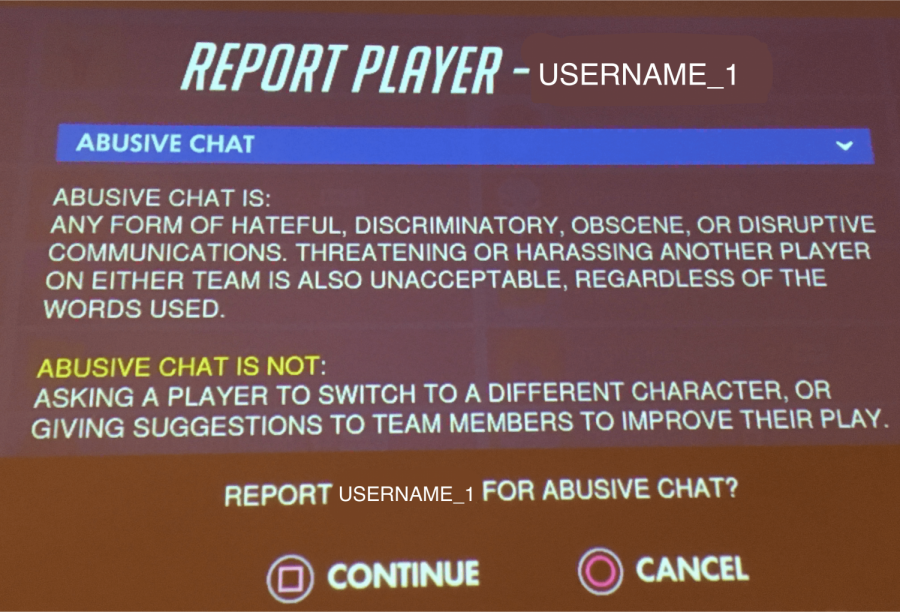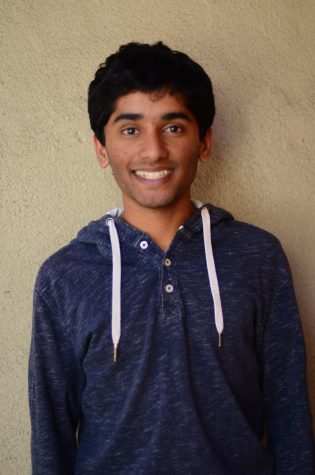Gamer aggression: the hate speech growing behind screens
A screen for reporting aggressive chats is displayed. Gamer aggression is a significant problem in the gaming community.
March 8, 2018
“Hey you, support, I said I needed healing. Do you maybe want to do your job and support me? Hey, is there actually something wrong with you, you piece of–”
At that point, after trying to explain that I was doing my best to help the team, I dropped my headset onto the desk, knowing the toxicity of the communication channel would only increase from there.
While playing support, a category of characters with the ability to heal and enhance team performance, snarky remarks from other players who always place the blame on the healer are common. But the comments don’t end there in most situations. They intensify, eventually degenerating into targeted, profane speech that ends up pertaining little to the game and instead just being a free flow of aggression.
While the language in team voice channels unsettles me every time I hear it, it is a form of speech I have sadly become accustomed with in the virtual world. Especially in the last few years, with the development of new voice chat channels in game or through separate communication platforms like Discord, Twitch, or even Reddit, hate speech has become pervasive.
In the majority of team-based games and related applications, it can range from caustic remarks about other players to wholeheartedly blatant aggressions often with misogynistic, culturally disparaging, or generally abhorrent language. As a response, game producers have tried to implement reporting systems to ban excessively aggressive players. Nonetheless, the majority of the issue is never dealt with, and the gaming community effectively becomes an echo chamber for this type of behavior. Voice channels come to function mostly as conducive environments for hate speech to live, feed, and proliferate, obscured by the anonymity of usernames and icons in the virtual world, instead of offering a platform for constructive communication.
It sometimes becomes easiest, then, for those on the outside to turn a blind eye to the problem in some form. Some simply aren’t aware of what goes on behind screens, while others categorize the problems as a flaw inherent in video games, thus justifying steering clear of gaming and gamers alike.
But turning a blind eye is exactly what allows the problem to grow and worsen. The atmosphere of the gamer culture is just a manifestation of systemic problems of xenophobia, vulgarity and hatred in physical society. It does not necessarily need to be tied to the concept of video games, but rather can simply been seen as a problem that has been left uncontested too long.
The thrill of video games is undeniable for me; it is the perfect escape on a Friday evening. But the flagrant hate speech that has become so closely tied to the experience does not and should not have to be associated with that. While the problem is difficult to solve because it has become so ingrained, the first step to improving the gamer culture is spreading awareness and transparently addressing the aggression, condemning it openly rather than condoning it through inaction and ignorance.


















![“[Building nerf blasters] became this outlet of creativity for me that hasn't been matched by anything else. The process [of] making a build complete to your desire is such a painstakingly difficult process, but I've had to learn from [the skills needed from] soldering to proper painting. There's so many different options for everything, if you think about it, it exists. The best part is [that] if it doesn't exist, you can build it yourself," Ishaan Parate said.](https://harkeraquila.com/wp-content/uploads/2022/08/DSC_8149-900x604.jpg)




![“When I came into high school, I was ready to be a follower. But DECA was a game changer for me. It helped me overcome my fear of public speaking, and it's played such a major role in who I've become today. To be able to successfully lead a chapter of 150 students, an officer team and be one of the upperclassmen I once really admired is something I'm [really] proud of,” Anvitha Tummala ('21) said.](https://harkeraquila.com/wp-content/uploads/2021/07/Screen-Shot-2021-07-25-at-9.50.05-AM-900x594.png)







![“I think getting up in the morning and having a sense of purpose [is exciting]. I think without a certain amount of drive, life is kind of obsolete and mundane, and I think having that every single day is what makes each day unique and kind of makes life exciting,” Neymika Jain (12) said.](https://harkeraquila.com/wp-content/uploads/2017/06/Screen-Shot-2017-06-03-at-4.54.16-PM.png)








![“My slogan is ‘slow feet, don’t eat, and I’m hungry.’ You need to run fast to get where you are–you aren't going to get those championships if you aren't fast,” Angel Cervantes (12) said. “I want to do well in school on my tests and in track and win championships for my team. I live by that, [and] I can do that anywhere: in the classroom or on the field.”](https://harkeraquila.com/wp-content/uploads/2018/06/DSC5146-900x601.jpg)
![“[Volleyball has] taught me how to fall correctly, and another thing it taught is that you don’t have to be the best at something to be good at it. If you just hit the ball in a smart way, then it still scores points and you’re good at it. You could be a background player and still make a much bigger impact on the team than you would think,” Anya Gert (’20) said.](https://harkeraquila.com/wp-content/uploads/2020/06/AnnaGert_JinTuan_HoHPhotoEdited-600x900.jpeg)

![“I'm not nearly there yet, but [my confidence has] definitely been getting better since I was pretty shy and timid coming into Harker my freshman year. I know that there's a lot of people that are really confident in what they do, and I really admire them. Everyone's so driven and that has really pushed me to kind of try to find my own place in high school and be more confident,” Alyssa Huang (’20) said.](https://harkeraquila.com/wp-content/uploads/2020/06/AlyssaHuang_EmilyChen_HoHPhoto-900x749.jpeg)








Jessie Wang • Mar 11, 2018 at 11:34 pm
I just wanted to thank you for actually playing as a support in Overwatch. It’s so hard to find people who do these days. In fact, although I’m a Soldier main, I find myself mostly playing Mervy in competitive because there are no other people who want to go healer except for maybe a Zen or a Moira(which are both basically dps), and dangit, Sym is not a healer, don’t put her in the support class, she’s obviously a defense.
So, yeah, thanks! Don’t let the toxicity of the chat get to you!